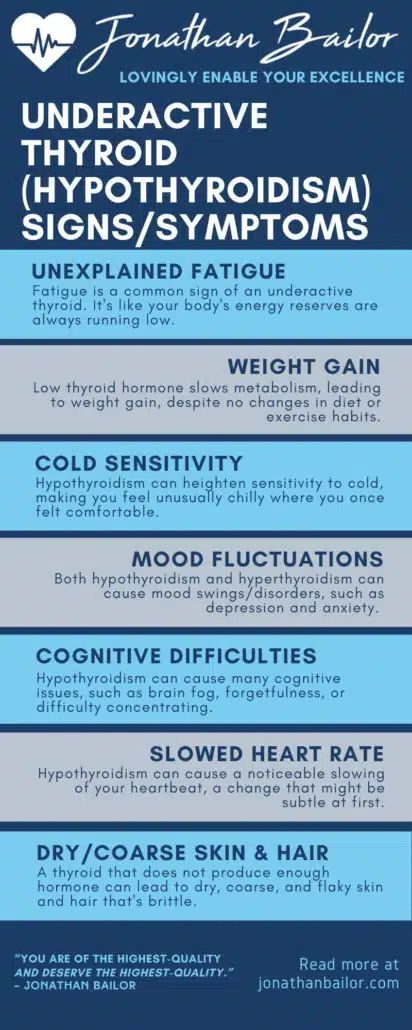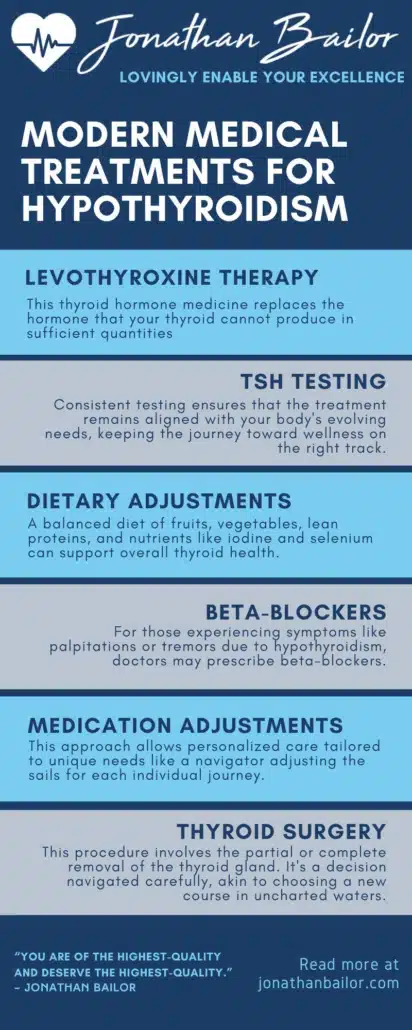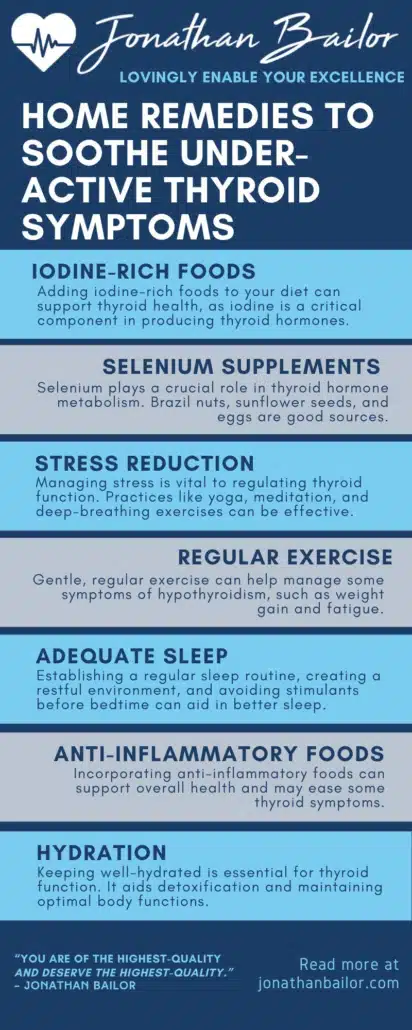8 Underactive Thyroid (Hypothyroidism) Signs & 13 Solutions
Navigating the road to wellness can often feel like solving a complex puzzle, especially when symptoms are vague and solutions seem elusive. An underactive thyroid is one such puzzle that many of us encounter yet might not immediately recognize. It’s a condition that silently affects many individuals, with subtle signs that can easily be mistaken for the general wear and tear of the body.
Jump into this thyroid health guide with Jonathan Bailor !
Understanding hypothyroidism, also called underactive thyroid, is crucial, especially as it can impact our daily vitality and long-term health in ways we might not anticipate. The thyroid gland, though small, is mighty in its influence, regulating metabolism, energy, the immune system, and overall well-being. When it’s not functioning as it should, the ripple effects can be far-reaching.
In this post, we’re not just listing the signs of an underactive thyroid gland but also exploring practical, empowering solutions. These insights are rooted in scientific understanding and compassionate, real-world advice. Whether you’re feeling a bit off and can’t pinpoint why or are simply proactive about your health, this exploration is for you.
Our journey through the signs and solutions of hypothyroidism is designed to be an enlightening and supportive experience. It is not about overwhelming you with medical jargon but rather providing clear, actionable insights that you can easily understand and apply in your daily life. We’re here to offer a guiding hand, helping you interpret your body’s signals and respond with care and wisdom.
Imagine sharing this newfound knowledge with friends and family, sparking conversations that could lead to better health and greater awareness. Picture yourself as the catalyst in your community, bringing light to a topic that, though common, is often shrouded in misunderstanding. By sharing this post, you’re not just passing on information; you’re spreading empowerment and care, traits that resonate deeply in our connected lives.
In a world where personal health is increasingly becoming a shared journey, your role is vital. You’re not just a reader but an integral part of a community that values health, understanding, and compassionate support. Let’s embark on this journey together, exploring the signs and solutions of a sluggish thyroid and moving towards a future of better health and shared knowledge.
Unveiling the Mystery: Understanding Underactive Thyroid (Hypothyroidism)
In our journey to understand our bodies better, it is essential to shed light on the roles played by different organs, particularly the thyroid gland. This butterfly-shaped gland, nestled in the front of our neck, might be small, but its impact on our overall health is monumental. It’s like an orchestra conductor, directing the complex symphony of our body’s metabolism.
The thyroid gland produces hormones that have a hand in managing various functions, including how our body uses energy, regulates temperature, and even responds to other hormones. Think of it as a thermostat setting the pace for energy usage and overall activity in your body. When the thyroid functions harmoniously, we feel balanced and full of vitality.
However, the scale can tip, leading to what we know as hypothyroidism. This occurs when the thyroid gland doesn’t produce enough key hormones, meaning the thyroid hormone levels are too low. This slows the body’s metabolic processes, akin to dimming the lights in what should be a well-lit room.
Hypothyroidism is a subtle yet impactful thyroid disease. It takes a while to develop hypothyroidism, and its onset is often gradual, making it easy to miss in the early stages. It’s like a slowly developing fog that gradually envelops the landscape, altering it almost imperceptibly. The reasons behind this slowdown in thyroid activity can vary, ranging from pituitary gland disorders and autoimmune conditions to certain medications and environmental factors.
Understanding an underactive thyroid is the first step in a journey toward regaining balance. It’s about recognizing that our body signals a need for attention and care. As we move forward, remember that knowledge is the first spark of empowerment. In the following sections, we’ll explore how to recognize the signs and respond effectively, lighting the way to better health and well-being.
Recognizing 8 Signs: Navigating the Waters of Underactive Thyroid
As we sail through the sea of health and wellness, it is vital to be vigilant and aware of the signs that may indicate a shift in our well-being. When it comes to hypothyroidism, the signs can often be subtle, blending into the ebb and flow of daily life.
Here, we’ll explore eight key signs and symptoms of hypothyroidism that may signal that your thyroid is not making enough thyroid hormone. Recognizing these signs is like spotting landmarks on a journey, guiding us toward a clearer understanding of our health.
1. Unexplained Fatigue
Imagine your energy as a radiant sun, normally fueling your day with light and warmth. With hypothyroidism, this sun seems to fade, leaving you feeling inexplicably tired, even after a full night’s sleep. Your body’s energy reserves are perpetually running low, no matter how much rest you get.
2. Weight Gain Without Dietary Alterations
Picture your body as a finely tuned scale, balancing calories in and out. Low thyroid hormone can tip this scale, leading to a slowed metabolic rate and unexpected weight gain despite no significant changes in diet or exercise habits.
3. Sensitivity to Cold
Imagine a sudden drop in temperature. Your body’s biological response is to shiver, trying to generate warmth. Hypothyroidism can heighten this sensitivity to cold, making you feel unusually chilly in environments that once felt comfortable. It’s like your internal thermostat is set lower than it should be.
4. Dry and Coarse Skin and Hair
Consider your skin and hair as reflections of your inner health. A thyroid that does not produce enough hormone can lead to noticeable changes, such as dry, coarse, and flaky skin and hair that is brittle and prone to breakage. The nourishing flow of health to these areas is diminished, leaving them less vibrant.
5. Muscle Weakness and Joint Pain
Think of your muscles and joints as the framework that supports your daily activities. Hypothyroidism can lead to feelings of weakness in your muscles, along with aches and pains in your joints. It is as if the usual strength and fluidity of movement have been compromised, affecting your physical capabilities.
6. Slower Heart Rate
Envision your heart as a steady drum, maintaining the rhythm of life within you. Hypothyroidism can cause a noticeable slowing of your heartbeat, a change that might be subtle at first, like a drummer gradually reducing their tempo without you immediately realizing it.
7. Cognitive Difficulties
Your brain, the command center of your body, relies on a fine balance of hormones to function optimally. Hypothyroidism can cloud this clarity, leading to forgetfulness or difficulty concentrating. It’s like a mist descending over your usual sharpness and focus.
8. Mood Fluctuations
Imagine your mood as a calm sea, reflecting the sky above. Low thyroid hormone production can stir this sea, leading to unexplained mood swings, depression, or anxiety. It is as if the hormonal imbalance creates ripples across the surface of your emotional well-being.
Recognizing these signs is the first step in charting a course toward better health. In the following sections, we’ll explore how to navigate these waters, offering practical solutions to address an underactive thyroid.

Feeling Better Is Priceless, That's Why We Don't Put A Price On It!
“It’s Like A Free and Medically Valid Version of Noom and Weight Watchers Online”
~ Dr. Doctor Matthew Oleshiak, MD
Click the 'LEARN MORE' button below for free lifetime access to the fast fix program developed by Jonathan and top Ivy League Medical Doctors
LEARN MOREP.S. It's not a free trial. It's not part of the program for free. The entire program is free, forever, for real! No credit card needed.
Navigating Allopathic Treatments: Modern Medicine’s Approach to Hypothyroidism
In modern medicine, there are several paths to address an underactive thyroid, each like a beacon guiding us toward restored health and balance. Allopathic treatments, grounded in years of research and clinical practice, offer effective solutions for managing this condition.
Here, we explore some of the common treatments that your health care provider may recommend, providing a glimpse into the options that modern medicine extends to those navigating the waters of underactive thyroid disease.
1. Levothyroxine Therapy
One of the most common and effective treatments for hypothyroidism is the prescription of levothyroxine, a synthetic thyroid hormone. This thyroid hormone medicine replaces the hormone that your thyroid cannot produce in sufficient quantities. The goal is to restore balance, like adding the missing piece to complete a puzzle. Dosage is carefully calibrated based on individual needs, and regular monitoring ensures the levels are just right, maintaining the harmony of your body’s functions.
2. Regular TSH Testing
Regularly monitoring thyroid-stimulating hormone (TSH) levels is essential to fine-tune the treatment of hypothyroidism. This blood test is a crucial tool, like a compass guiding the journey, helping doctors understand how well your thyroid is functioning and adjust medication dosages accordingly. Consistent testing ensures that the treatment remains aligned with your body’s evolving needs, keeping the journey toward wellness on the right track. These blood tests are typically the first diagnostic tool for thyroid disease.
3. Dietary and Nutritional Adjustments
Modern medicine also recognizes the power of dietary strategies in managing hypothyroidism. A balanced diet of fruits, vegetables, and lean proteins can support overall thyroid health. In some cases, doctors may advise increasing the intake of certain nutrients like iodine and selenium, essential for thyroid hormone production, akin to fortifying the body with the right building blocks for optimal function.
4. Beta-Blockers for Symptom Management
For those experiencing symptoms like palpitations or tremors due to hypothyroidism, doctors may prescribe beta-blockers. These medications can help manage these symptoms, providing relief like a calm shelter provides respite from a storm. It’s a targeted approach, addressing specific challenges on the path to managing hypothyroidism.
5. Personalized Medication Adjustments
The journey with hypothyroidism is unique for each individual, and so is the treatment. Physicians often take a personalized approach to medication, adjusting dosages based on a physical exam and factors like age, weight, other health conditions, and response to treatment. This approach allows personalized care tailored to unique needs like a navigator adjusting the sails for each individual journey.
6. Thyroid Surgery
In some instances of underactive thyroid, there are structural issues with the thyroid gland itself, such as significant enlargement or nodules, or in cases of severe hypothyroidism, surgery may be considered. This procedure involves the partial or complete removal of the thyroid gland. It’s a decision navigated carefully, akin to choosing a new course in uncharted waters.
Post-surgery, patients typically require lifelong thyroid hormone replacement therapy, given that the body’s natural hormone production is affected. The surgery aims to address the root cause and bring a more permanent solution.
These allopathic solutions for hypothyroidism thyroid reflect modern medicine’s commitment to restoring health and balance. They offer pathways that, combined with informed self-care and regular medical guidance, improve well-being and quality of life.

Complementing Wellness: Home Remedies to Soothe Underactive Thyroid Symptoms
In the journey of managing hypothyroidism, blending medical treatments with natural remedies can create a harmonious approach to wellness. While these home remedies should never replace professional medical advice or treatments, they can serve as valuable adjuncts, offering additional comfort and support. Think of them as gentle currents that aid the sails of allopathic treatments, helping to navigate the waters of hypothyroidism with a little more ease.
Here, we explore several natural remedies that can complement your ongoing medical regimen, providing a holistic approach to soothing underactive thyroid symptoms.
1. Iodine-Rich Foods
Incorporating iodine-rich foods to your diet can support thyroid health, as iodine is a critical component in producing thyroid hormones. Foods like seaweed, fish, and dairy are natural sources of iodine. It’s about adding a sprinkle of these iodine-rich ingredients to your meals like a chef subtly enhancing the flavor of a dish. However, finding a balance is important, as too much iodine can also aggravate thyroid issues.
2. Selenium Supplements
Selenium plays a crucial role in thyroid hormone metabolism. Foods like Brazil nuts, sunflower seeds, and eggs are good sources of selenium. Adding these to your diet is akin to providing the right tools to an artisan, aiding in fine-tuning thyroid function. As with any supplement, it’s important to discuss with your doctor if it’s the right amount for your specific needs.
3. Stress Reduction Techniques
Managing stress is vital to regulating thyroid function. Practices like yoga, meditation, and deep-breathing exercises can be effective. These techniques are anchors, grounding you amidst the stormy seas of stress, which can often exacerbate thyroid symptoms. These practices encourage a state of calm, aiding the body’s natural ability to heal and maintain balance.
4. Regular Exercise
Gentle, regular exercise can help manage some symptoms of hypothyroidism, such as weight gain and fatigue. Activities like walking, swimming, or cycling are excellent choices. It’s like taking your body on a gentle voyage, enhancing circulation and energy levels while supporting overall health.
5. Adequate Sleep
Ensuring sufficient and quality sleep is crucial for thyroid health. Establishing a regular sleep routine, creating a restful environment, and avoiding stimulants before bedtime can aid in better sleep. Think of sleep as a serene harbor where your body can dock and undergo repairs and rejuvenation.
6. Anti-inflammatory Foods
Incorporating anti-inflammatory foods can support overall health and may ease some thyroid symptoms. Foods like berries, leafy greens, and turmeric are known for their anti-inflammatory properties. Including these in your diet is like planting a garden of healing herbs, each contributing to a more balanced and less inflamed bodily state.
7. Hydration
Keeping well-hydrated is essential for overall health and can support thyroid function. Drinking adequate water throughout the day is akin to ensuring a steady flow of the body’s self-sustaining river. It aids in detoxification and maintaining optimal body functions, which is crucial when dealing with a thyroid condition.
Incorporating these natural remedies into your daily regimen can offer supportive care for managing hypothyroidism. They serve as complementary practices, enhancing the effectiveness of your medical treatments and contributing to a holistic approach to your health and well-being.

Thyroid Health: Answers to Your Frequently Asked Questions
Navigating the realm of thyroid health can often bring a flurry of questions to the surface. It’s natural to seek clarity and understanding about this vital aspect of our well-being. In this FAQ section, we aim to shed light on some of the most commonly asked questions regarding thyroid health, providing answers that combine accuracy with understanding. Let’s explore these questions together, enhancing our knowledge and empowering our journey towards better health.
Q1: What’s the function of the thyroid gland in our body?
The thyroid gland, a small butterfly-shaped organ located at the front of the neck, plays a pivotal role in regulating our body’s metabolism. It produces thyroid hormones, which act like a conductor, directing the speed and efficiency of how our body uses energy. This regulation affects various functions, from heart rate and body temperature to muscle strength and cholesterol levels. A well-functioning thyroid ensures a harmonious balance in our body’s daily operations.
Q2: How do I know if my thyroid is not functioning properly?
Signs of thyroid dysfunction can vary depending on whether it’s underactive (hypothyroidism) or overactive (hyperthyroidism). Hypothyroidism symptoms include fatigue, weight gain, cold sensitivity, and dry skin, while an overactive thyroid gland may present symptoms like weight loss, rapid heartbeat, and anxiety. It’s important to note that these symptoms can be subtle and gradual, making it crucial to consult a healthcare professional for accurate diagnosis and management.
Q3: Can diet impact thyroid health?
Diet plays a significant role in thyroid health. Certain nutrients, such as iodine, selenium, and zinc, are essential for thyroid hormone production and function. Foods rich in these nutrients, like seafood, nuts, and seeds, can support thyroid health. Conversely, excessive consumption of certain foods, like soy products and cruciferous vegetables, might affect thyroid function, especially in individuals with existing thyroid issues. It’s about finding a balanced and nutritious diet tailored to the body’s specific health needs.
Q4: Is thyroid dysfunction hereditary?
Thyroid disorders can have a hereditary component, especially if they’re due to an autoimmune disorder like Hashimoto’s thyroiditis, the most common cause of hypothyroidism. You may be at a higher risk if there’s a family history of thyroid problems. However, environmental factors, lifestyle choices, and other health conditions also play significant roles in thyroid health. Knowing your family history can be a key factor in the early detection and proactive management of thyroid conditions.
Q5: Can stress affect my thyroid?
Stress can indeed impact thyroid function. Chronic stress may lead to an imbalance in the body’s cortisol levels, which can interfere with thyroid hormone production and metabolism. This disruption can exacerbate existing thyroid conditions or even contribute to developing new thyroid issues. Managing stress through relaxation techniques, regular exercise, and a balanced lifestyle can, therefore, be beneficial in maintaining healthy thyroid function.
Embarking Together: Sharing the Journey of Thyroid Health
As our exploration of thyroid health draws to a close, we hope this journey has illuminated the path toward understanding and managing thyroid-related challenges. Our shared exploration—from recognizing signs to considering both medical and natural remedies—is a testament to the power of knowledge and proactive health care. We invite you to extend this journey beyond yourself. Share these insights with friends and family through social media and email. Let’s build an informed, empowered, and supportive community, fostering a collective journey toward better health and wellness for all.
Feeling Better Is Priceless, That's Why We Don't Put A Price On It!
“It’s Like A Free and Medically Valid Version of Noom and Weight Watchers Online”
~ Dr. Doctor Matthew Oleshiak, MD
Click the 'LEARN MORE' button below for free lifetime access to the fast fix program developed by Jonathan and top Ivy League Medical Doctors
LEARN MOREP.S. It's not a free trial. It's not part of the program for free. The entire program is free, forever, for real! No credit card needed.




